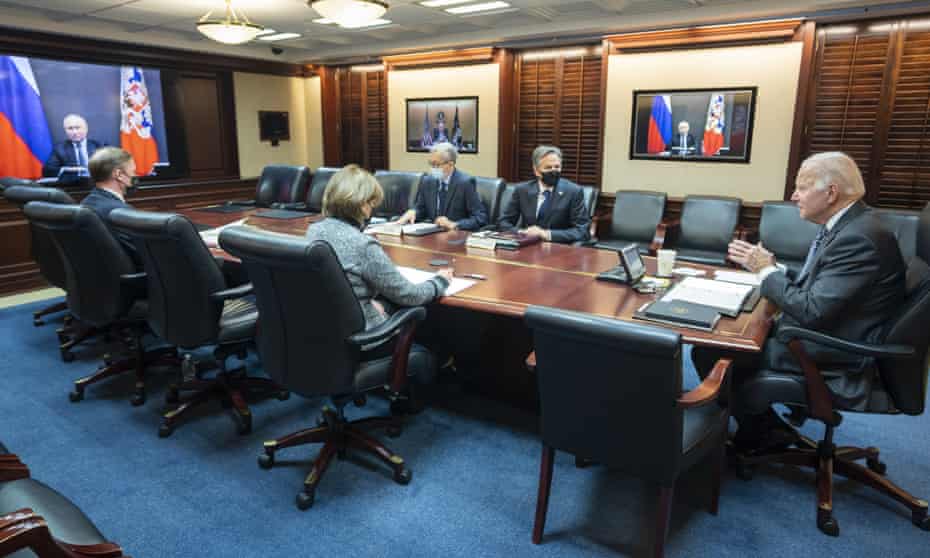US president makes pledge in phone calls to Ukrainian president and nine other states

Joe Biden has phoned the leaders of Ukraine and nine eastern European Nato states promising support if Russia attacks Ukraine and pledging to involve them in decisions about the region.
After a 90-minute call with Biden late on Thursday, Ukrainian president Volodymyr Zelenskiy said on Twitter that the two “discussed possible formats for resolving the conflict” in eastern Ukraine, where Russian-backed separatists have carved out a self-declared state.
After Zelenskiy, Biden spent 40 minutes talking to the leaders of Bulgaria, the Czech Republic, Estonia, Hungary, Latvia, Lithuania, Poland, Romania and Slovakia – all of which, unlike Ukraine, joined Nato in the wake of the 1991 Soviet collapse.
Biden reassured the leaders that nothing would be agreed with Russia about the region behind the backs of its countries, an adviser to Lithuania’s president told reporters.
“Biden said, ‘nothing about you without you’”, said Asta Skaisgiryte.
The calls came amid mounting tensions over a Russian military buildup on Ukraine’s borders – and unease among east-European states over US plans to hold talks with Moscow.
Officials in Poland and other eastern and central Nato countries have privately bristled at Biden’s description of seeking an “accommodation” with Russia, worrying that any trade-off could increase the danger they face from an expansionist Russia.
“Russia must not be given any say in how Nato organises the defence of its territory” or in who can join the military alliance, said the Estonian prime minister, Kaja Kallas, in public remarks on Thursday. “What is most alarming is Russia’s desire to turn Europe into spheres of influence. It is unacceptable and morally indefensible, and Russia must be made aware of that in clear terms.”
Eastern Nato members are expected to demand a seat at the table before Biden reveals more details about the talks on Friday.
“We have said many times that we must be included in anything that is discussed in our region; nothing should be discussed without us,” said Linas Linkevičius, a former foreign minister and defence minister of Lithuania.
“The intentions of Russia are well-known, they were always trying to split, divide, marginalise, so that’s nothing new … we have to maintain unity and a principled decision, especially when we have this possible aggression against Ukraine.”
Linkevičius, like others, noted that there was little public information about the talks available yet and said that many officials were probably waiting for more information from the Biden government before speaking publicly about them.
A diplomat from a Baltic state said there was concern that the talks being announced as Russia maintains its military buildup on the border of Ukraine “looks like Putin getting what he wants”.
One senior official from an eastern Nato state also told the Financial Timesthat any talk of compromise with Moscow “must be immediately cut at the root”. Russia has said it is expecting “discussion of strategic security on the continent”.
Biden’s calls on Thursday night were the first direct conversations with the group since he held a two-hour video call with Vladimir Putin on Tuesday.During the virtual summit, he warned the Russian president about potential sanctions if he launched an offensive in Ukraine.
Directly after that call, he spoke with Boris Johnson, Angela Merkel of Germany, Emmanuel Macron of France, and Mario Draghi of Italy. Biden has said the talks with Russia will include “at least four of our major Nato allies and Russia to discuss the future of Russia’s concerns relative to Nato writ large”.
Michal Baranowski, the director of the German Marshall Fund’s Warsaw office, said that there had been support in Poland for Biden’s strong response to Russia’s military buildup in Ukraine, which has included threats of sanctions against Russia and vocal support for Ukraine’s sovereignty.
The decision to announce the new Russia talks had caused “confusion” and “some anger” in Poland, he said, because it signalled a change of direction in the White House’s thinking.
It would be “detrimental” if Poland, Romania, and other eastern flank countries were excluded from the talks, he said.
“The reaction would be very negative and it would send a clear signal to Russia that, look: if you need to talk about European security, don’t worry about what those pesky central Europeans are thinking, you just have to talk with the big powers,” he said.
Any movement toward limiting who could join Nato would recognise a Russian sphere of influence, he said, putting Poland and other eastern flank countries at greater risk.
“Even if nothing comes out of this, even if they just sat down to just listen to the grievances of the Russians, let alone, God forbid, that there would be any sort of agreement, then people will be talking about Munich and Yalta,” he said, referring to past settlements with Nazi Germany and the Soviet Union.
Linkevičius similarly said that Biden’s “transparency” in its response to the Russian buildup had been well regarded in Lithuania, and that it was important to maintain unity across Europe and Nato.

Leave A Comment